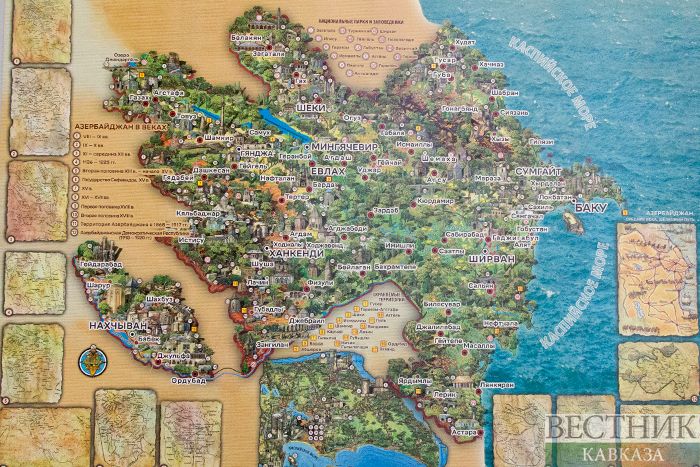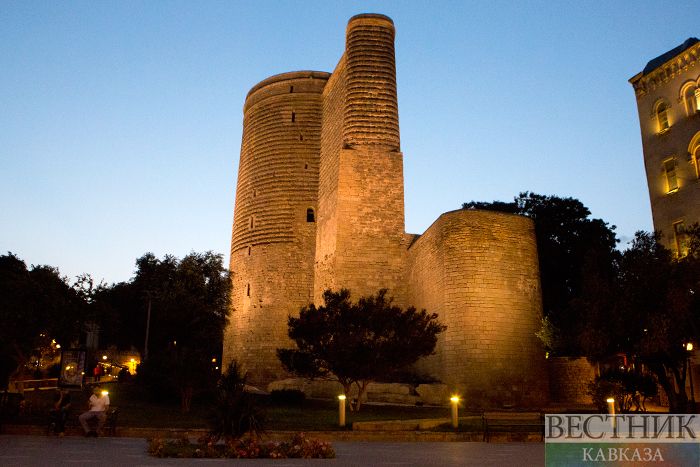With international travel on pause, Azerbaijan Tourism Board is inspiring Azerbaijanis themselves to discover the diverse, authentic offerings the country has to offer, more conveniently than ever. In a typical year, domestic tourism accounts for 54 percent of Azerbaijan’s overall travel economy. When the pandemic hit, and the international borders of the country were closed for inbound travelers, domestic tourism became more important than ever, Skift writes.
In 2020, Azerbaijan Tourism Board (ATB) launched the new campaign, “Macəra Yaxındadır” — translating to “Adventure is Near” — encouraging Azerbaijanis themselves to discover the rich and diverse offerings of their own country, from the prehistoric petroglyphs of Gobustan and the Sheki Khans’ Palace, to hiking in the Caucasus mountains and the ever-burning patches of Yanardag. “We have been working on an overarching strategy that focuses on promoting domestic tourism,” said Florian Sengstschmid, CEO of Azerbaijan Tourism Board. “Straddling the border between East and West, Azerbaijan contains geographical features of both, resulting in a remarkable range of landscapes, habitats, and climate zones. Our strategy is to develop new routes and products around the country based on these features, while preserving and reinforcing all of its strengths and beauty.”
Nature and outdoor tourism
Judging by international trends, even when a sense of post-pandemic normalcy has returned, travelers will continue to opt to be outdoors rather than in crowded indoor places, with more interest in the countryside, small towns, villages, national parks, and reserves. “Certainly, the pandemic fueled a growing demand for nature-related, eco-friendly, and outdoor activities,” said Sengstschmid.
For the outdoors-focused traveler, Azerbaijan has almost every kind of geography to explore, from forests and steppes, to hundreds of kilometers of sea and coastline, and northern regions dominated by the majestic Caucasus mountains. Thanks to recent developments, it will be easier than ever before to hike, cycle, and camp in these landscapes — and travel between them. In 2020, ATB launched a trail marking project, designating and signposting 15 new hiking routes across the country. Around 150 kilometers’ worth of trails will also serve to connect remote mountain villages.
With around 400 species of birds recorded in Azerbaijan, ATB is also encouraging birdwatching throughout the country. Working closely with international birding experts and Azerbaijan Ornithological Society, ATB has established certified birdwatching destinations, with a particular focus on preserving and developing the new Beshbarmag State Reserve, northwest of Baku. A new Beshbarmag State Reserve center will help to protect and keep track of the area’s bird population and serve as a birdwatchers’ hub. In addition, ATB has published a birdwatching brochure that includes information on existing birdwatching spots, birdwatching seasons, and primary bird species to see, and facilitated the training of 11 birdwatching/nature guides to lend their expertise to travelers.

Hospitality infrastructure and guest house improvements
“Opening the door to complete strangers like friends and giving a warm welcome is one of the most amazing natural qualities of the Azerbaijani people,” said Sengstschmid. With ATB’s focus on improving services and standards, the overall experience of traveling within the country promises to be even more welcoming. “Accommodation is one of the critical support mechanisms required to create well-functioning destinations.”
To improve overall services and standards, ATB launched a project to provide hospitality training to hotels, guides, travel agencies, and guesthouse and homestay operators across the country. Hospitality professionals received training in topics such as housekeeping, food and beverage, and front office operations. “Our goal is to keep the authenticity of these guesthouses, simultaneously setting the standards for the accommodation and providing the best experience for the travelers to come,” Sengstschmid explained.
The State Tourism Agency and ATB have developed a digital booking tool, set to launch later in 2021. Designed specifically for the domestic market, it will allow consumers to book a stay in a guesthouse or homestay more easily and efficiently. By the same token, operators will be provided with technical support necessary to operate successfully in the new digital economy.
“We are also currently looking into opportunities to establish structures that can link guesthouses and homestays with various industry support networks such as the Azerbaijan Hotel Association and the Azerbaijan Tourism Volunteers Organisation,” said Sengstschmid. “This way, they will benefit from access to promotional opportunities, trainings, and have a voice at the table with government and industry.” Lastly, ATB conducted a National Guesthouse and Homestay Survey, the results of which will inform an upcoming grants program, allowing ATB to respond to the industry’s most critical infrastructure and development needs.
Slow food tourism
“Thanks to the country’s geographical location, every region of Azerbaijan is famous for a specific produce, which is the foundation for the rich flavors of Azerbaijani cuisine. When you add in all the spices and multiculturalism brought centuries ago along the Silk Road, it makes for a surprisingly vibrant culinary scene,” said Sakina Asgarova, slow food project manager at ATB.

In one of its exciting initiatives, ATB is encouraging travelers to get hands-on with the activities of farmers and producers while enjoying overnight accommodation in rural Azerbaijan farmhouses. “Depending on the season, they shall be able to get active with seeding, planting, cultivating, feeding, harvesting, processing, filling, packaging — as well as cooking and tasting, of course,” said Ms. Asgarova.
The emphasis, Ms. Asgarova explained, will be on activities involving local products on the brink of extinction (“presidia” products), including mountain honey, the Madrasa grape and wine, hazelnuts, rosehip syrup, and dairy products from buffalo milk.
Another ATB initiative currently in development is the Slow Food Cooking Challenge, which will promote local products while also drawing attention to the similarities between Azerbaijani, Italian, and Chinese cuisine, in an effort to bolster relations between the countries. A collaboration with Azerbaijan Cooks’ Alliance, a collective comprising seven of the country’s master chefs, promotes Azerbaijan’s top organic products throughout the country. ATB’s Slow Food Project has also developed Slow Food information kits for schools, and worked with local culinary tour operators and guides, equipping them with the knowledge of the country’s gastronomic heritage to pass on to visitors.
Heritage and cultural tourism
Tourism in Azerbaijan dates back thousands of years, with a diversity of people contributing to the country’s rich heritage and multiculturalism, from Silk Road traders to the ancient Zoroastrians, who made pilgrimages to Baku’s spectacular eternal fires, to fire-worshipping Indians who left their traces at Ateshgah Fire Temple. Through the “Adventure is Near” campaign, ATB is celebrating the country’s unique history as a crossroads and hub, as well as such UNESCO World Heritage Sites as the Old City (Icherisheher) in Baku, Maiden Tower, Shirvanshahs’ Palace, and Sheki Khans’ Palace. ATB has also been developing new walking tours to highlight, among other things, the country’s Polish and Jewish heritage.

Maiden Tower, Old City, BakuIt’s also working to promote Shusha, “one of the major cultural centres of Azerbaijan since ancient times,” said Sengstschmid. The city was home to many Azerbaijani composers, musicians, and poets who played a significant role in the country’s culture, as well as one of the leading schools of mugham, the traditional Azerbaijani genre of vocal and instrumental arts. It is also known for its carpet-weaving traditions and was the centre of the Karabakh carpet school.
As well as enabling and encouraging domestic tourism in Azerbaijan, ATB’s efforts will have ramifications beyond its borders. In 2021 and beyond, Azerbaijan looks set to lure international travelers with the promise that “adventure is near.” “We plan to resume global marketing and communications once international travel restrictions are eased,” said Sengstschmid. “We want Azerbaijan to emerge as a tourism destination on the global stage stronger than ever before.”






